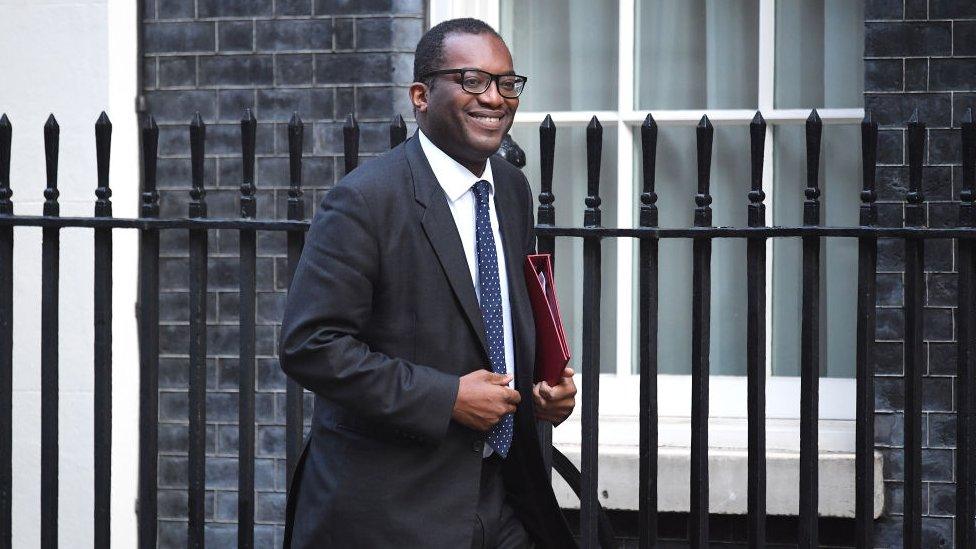Government approach to business 'chaotic' and 'incoherent', says Heseltine
- Published

Former Conservative industry secretary Lord Heseltine has described the government's approach to engaging with business as chaotic and incoherent.
Lord Heseltine famously once said he would intervene in business and markets "before breakfast, lunch and dinner" if necessary, but takes a dim view of government strategy now.
"Under the present government it's all got chaotic," he said.
"One minute you have got an industrial strategy, the next minute you haven't."
"New committees are set up then disbanded," he added.
"I think they are throwing money indiscriminately at a whole range of projects with very little attempt to co-ordinate the results, and very little attempt to mobilise local strengths, and very little attempt to analyse the competitive challenges we face."
A spokesman for the Department for Business, Energy & Industrial Strategy (Beis) responded that its "Plan for Growth" recognises that a "strong and active government within a dynamic enterprise economy is central to our success".
"Through major public investment in infrastructure, skills and innovation, we're going even further to support the creation of new industries and good-quality jobs, levelling-up every part of the UK," the spokesman said.
But what is the appropriate relationship between government and business?

Airbus has a site near Bristol
I recently went to meet the Business Secretary Kwasi Kwarteng at Airbus's Filton site near Bristol.
Airbus is a good example of government involvement in business. A pan-European government-driven and part-funded mission to take on American aviation giants.
The UK's arms-length stake was sold off long ago, and recently Airbus was a fierce critic of Brexit, but it was all smiles as Mr Kwarteng officially launched a new £40m wing-technology centre, to which the government contributed £20m.
"It's a very close partnership," said Mr Kwarteng. "During Brexit Airbus had one view, the government had another view, but today what's striking is that we are completely united.
"Airbus is a first rate company and they are very keen to engage with government collaboratively."
In the past the Conservative Party orthodoxy seemed to be to set taxes as low as possible, regulation as light as sensible, and let the so-called "wealth creators" get on with it.
So what has happened to the DNA of the Conservative government?

"I think we are always a free market party," Mr Kwarteng said. "But in 2021 we realise there are a whole range of industries that have a strategic relevance to the UK and we are very, very happy to work with the private sector to drive innovation."
But shadow business secretary Ed Miliband is not convinced the Conservative Party truly believes in a muscular role for the government in business.
"I think the problem with this government is that, first of all, we know that they have recently torn up the idea of having an industrial strategy, a white paper, and abolished the industrial strategy council," he said.
"Now that tells you something about them, which is basically they believe, more or less, that the market is going to serve us well, mainly on its own. So they pay lip service to the idea of the public sector playing a muscular role alongside the private sector.
"But it's not happening in practice. And that is deeply regrettable, because we face such massive challenges as a country, whether it's the climate crisis, or the inequality crisis, or recovering from Covid.
"The only way we succeed is with public working with private to create the wealth and tackle those challenges."
'Companies owe governments for early help'
The problem for left and right is that governments are famously hopeless at investing, right?
"Not necessarily" said Marianna Mazzucato, a professor at UCL, and author of "Mission Economy - A Moonshot Guide to Changing Capitalism".
She said many of America's world-beating companies owe the US government their start in life.
"Tesla is doing quite well and everyone thinks that is just simply due to Elon Musk's genius, but Elon Musk, across his three different companies, has actually received $5bn from the US government," she says.
"Remember, the background is the US government is the financier basically of everything that makes our iPhones smart and not stupid - internet, GPS, touchscreen, Siri," Ms Mazzucato added.
"Actually government in many parts of the world has a really good track record, sometimes, so the point is not to just to say 'The DNA of government means they can't pick particular types of investments'.
"The way we should be doing it is not picking winners but picking the willing.
"So basically, once you choose the direction - towards a clean growth strategy for example - what does it mean to actually be able to support those kinds of companies in sectors that are willing to transform themselves to move into that direction?"

Former Labour Business Secretary Lord Mandelson said you have to be clear what industrial strategy is not.
"Industrial strategy isn't ministers replacing markets, it's not civil servants taking the place of chief executives," he said.
"It isn't government going around picking individual business winners, and instead finding out that the losers are instead picking the government, but what it is, in my view, is government acting as catalyst as a longer term planner and coordinator as investor.
"A big investor, when necessary, when financial markets shy away from risk, and also a supportive regulator for innovation.
"I mean, that's where I see industrial strategy, underpinning the partnership between business and government."
While both left and right may struggle to define what a successful industrial strategy should look like, both sides know it when they see it.
Lord Mandelson said the vaccine rollout was an exemplar of industrial strategy working.
"I mean, look at what we achieved in the case of the vaccine," he said.
"The government staffed-up and invested in a portfolio of very high-risk technology ventures through a taskforce led by a venture capitalist, which was in turn based on very substantial public funding of the original research, the invention by Oxford University.
"Nimble accelerated regulation by the government helped expedite and accelerate the process.
"And then you had manufacturing by the private sector, and finally, distribution by the National Health Service.
"Now, one thing this wasn't, was a model of pure capitalism. And to me, it demonstrated the power of public procurement and coordination across the board, inside government and across the public and private sectors."
'Nothing new about levelling up'
Lord Heseltine had one more brickbat to throw at the government.
He also said there was nothing new about the idea of "levelling up" and said that Margaret Thatcher had personally backed his own version of it through investment in Liverpool after the Toxteth riots, but that the current Conservative government's approach was disorganised.
"Levelling up becomes part of the political imperative but there's no coherence or strategic plan behind it," he said.
"Margaret is interesting because she is seen by some people as the arch non-interventionist but of course that's absolute nonsense.
"She gave me the go-ahead to create the Development Corporations, which have been responsible for most of the really exciting urban regeneration schemes over the last 30 or 40 years."
Mr Kwarteng said the recent successes in the mayoral election in Teeside and by-election in Hartlepool was evidence the government approach to investing in former Labour strongholds was paying political dividends.
"It's no accident that voters are swinging towards the government in a way unprecedented since the war," he said. "It shows the message of investment in skills and levelling up is really resonating."
Lord Heseltine revealed that a Conservative colleague said to him in the 1980s: "Michael, what are you doing in Liverpool? There are no votes in it."
"I was bowled over by this," Lord Heseltine said. "I was doing it because it was right, not to win votes. If you gain the respect of the electorate then they will vote for you."
There are voices on the hard right, who think that government is always the problem and any project with government backing is doomed, and there are those on the left who think that government is always the answer to ensuring fair outcomes and banishing greedy economic rent seekers.
One thing I can report is that the business community want the government to have an industrial strategy and quietly lament the retirement of that label in favour of the new "Plan for Growth".
Labels aside, what is striking - remarkable even - is the general level of consensus between left and right that the challenges of the two greatest crises facing the global economy - Covid and climate - mean that government and business have never needed each other more than they do right now.
Related topics
- Published23 March 2021

- Published2 February 2021

